This article needs additional citations for verification .(September 2023) |
Alfonso Barrantes Lingán | |
|---|---|
 Alfonso Barrantes Lingán (1979) | |
| Mayor of Lima | |
| In office 1 January 1984 –31 December 1986 |
This article needs additional citations for verification .(September 2023) |
Alfonso Barrantes Lingán | |
|---|---|
 Alfonso Barrantes Lingán (1979) | |
| Mayor of Lima | |
| In office 1 January 1984 –31 December 1986 |

The Peruvian Aprista Party is a Peruvian social-democratic political party and a member of the Socialist International. The party was founded as the American Popular Revolutionary Alliance by Víctor Raúl Haya de la Torre, who originally intended to create a network of anti-imperialist social and political movements in Latin America. Members are called "compañeros" (fellows), based on the fraternity espoused by Haya de la Torre. Originally a centre-left to left-wing party with democratic socialist and nationalist elements, the party moved closer to the political centre under the leadership of Alan García starting in the 1980s, embracing social democracy and later some Third Way policies. In 2006, the party adopted a new platform as García's second presidency implemented a series of policies labelled as centre-right, embracing free-market capitalism, dialogue with other right-wing parties and organizations in the country, and closer ties with the Catholic Church and Evangelical churches.

Julio Anguita González was a Spanish politician. He was Mayor of Córdoba from 1979 to 1986, coordinator of United Left (IU) between 1989 and 1999, and Secretary-General of the Communist Party of Spain (PCE) from 1988 to 1998. Due to his enormous influence and his absolute majorities in the Córdoba city council, he was nicknamed el califa rojo.

María Elena Moyano Delgado was an Afro-Peruvian community organizer and feminist who was assassinated by the Shining Path. She grew up in poverty in the Villa El Salvador pueblo joven, then became involved in local activism. She was twice president of FEPOMUVES and at the time of her death was deputy mayor. Her funeral was attended by 300,000 people and resulted in a downturn in support for the Shining Path. She received the Peruvian Order of Merit posthumously.

Óscar Luis Castañeda Lossio was a Peruvian politician who was the Mayor of Lima, the capital city of Peru, from 2003 to 2010. He became Mayor of Lima again in 2015, after being elected for a third nonconsecutive term with 51% of the popular vote, for a term that lasted until 31 December 2018. He ran for President of Peru twice, in the 2000 elections placing fifth, prior to his mayoral campaign in 2002, and in the 2011 elections, placing fifth again with 9.8% of the vote.
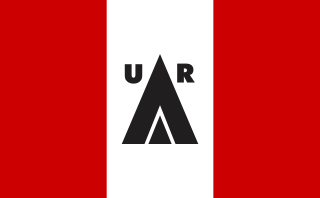
The Revolutionary Union, was a nationalist political party in Peru founded in 1931 by Luis M. Sánchez Cerro, former president of Peru. The party was formed following the coup with which Sanchez Cerro overthrew the eleven-year dictatorship of Augusto B. Leguía. Initially an authoritarian-populist organization, the party later transitioned towards fascism following the assassination of its founder, with Luis A. Flores assuming leadership in 1933 and consolidating this ideological shift.

The Christian People's Party is a centre-right and conservative political party based on the principles of Christian democracy. It was founded in 1966 by Christian Democratic Party dissidents, led by Luis Bedoya Reyes, at the time mayor of Lima.

United Left was an alliance of leftist political parties in Peru founded in 1980 by Popular Democratic Unity (UDP), Revolutionary Left Union (UNIR), Peruvian Communist Party (PCP), Revolutionary Socialist Party (PSR), Revolutionary Communist Party (PCR) and FOCEP.

Pontifical Catholic University of Peru is a private university in Lima, Peru. It was founded in 1917 with the support and approval of the Catholic church, being the oldest private institution of higher learning in the country.

Luis Miguel Sánchez Cerro was a high-ranking Peruvian army officer, revolutionary, nationalist and politician who served as the 41st President of Peru, from 1931 to 1933 as well as Interim President of Peru, officially as the President of the Provisional Government Junta, from 1930 to 1931. On August 22, 1930, as a lieutenant-colonel, he overturned the eleven-year dictatorship of Augusto B. Leguía after a coup d'état in Arequipa.
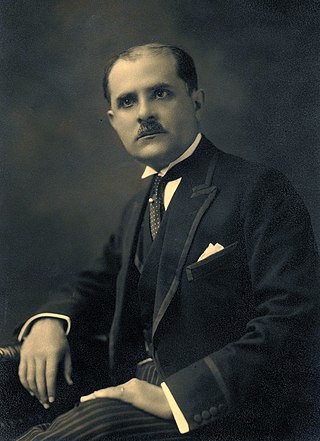
Luis Antonio Eguiguren Escudero was a Peruvian educator, magistrate, historian and politician. He was the director of the General Archive (File) of the Nation (1914), Alderman of Lima (1914–1920), Mayor of Lima (1930), President of the Constituent Congress (1930–1932), founder and leader of the Peruvian Social Democratic Party. He won the Peruvian presidential election of 1936, but his victory was ignored by the Congress and the then-President Oscar R. Benavides, who claimed that he had won with votes of the APRA. He presided over the Supreme Court and the Judiciary in 1953 and 1954.
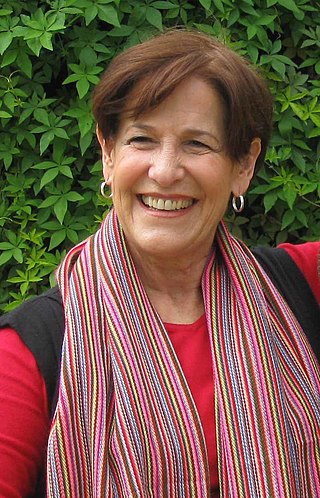
Susana María del Carmen Villarán de la Puente is a left politician in Peru, a former presidential candidate, and in municipal elections in 2010 became the first woman to be elected Mayor of Lima.
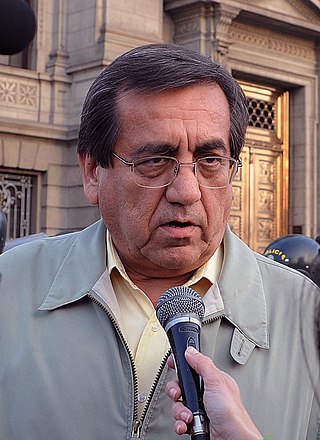
Jorge Alfonso Alejandro del Castillo Gálvez is a Peruvian lawyer and politician. In his career, he has served in the now abolished Peruvian Chamber of Deputies between 1990 and 1992, in the unicameral Congress of the Republic for six non-consecutive terms, between 1995 and 2011 and again from 2016 to 2019, five of which are consecutive terms, and as Mayor of Lima and the District of Barranco during the 1980s.
Henry Gustavo Pease García, known as Henry Pease, was a Peruvian politician and a former Congressman. He ran for President under the United Left in the 1990 general elections but placed fourth with 8.2% of the popular vote and failed to qualify for the run-off.

The urban community of Huaycán is a town of Lima, Peru, located in Ate District, approximately 16.5 kilometres east of Lima. It is home to thousands of immigrant settlers from different parts of Peru, looking to improve their standard of living and job opportunities in the city of Lima.

General elections were held in Peru on 8 April 1990, with a second round of the presidential elections on 10 June. This exercise was to elect the President of the Republic, two vice presidents, and the members of Congress. The elections filled 180 seats in the Chamber of Deputies and 60 seats in the Senate for the 1990-1995 governmental period.

Isaac Alfredo Barnechea García is a Peruvian journalist and politician. In the 2016 elections, he ran for President of Peru under the Acción Popular party, finishing in fourth place. He was among the potential candidates for the 2021 general election until he withdrew his pre-candidacy in November 2020. The nomination was subsequently won by Yonhy Lescano.
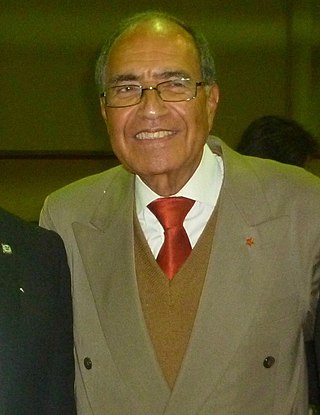
Carlos Roca Cáceres is a Peruvian politician. A prominent member of the Peruvian Aprista Party, he was signaled in his youth as one of Víctor Raúl Haya de la Torre's main disciples, alongside future President of Peru, Alan García. In his political career, he served in the Constituent Assembly of 1978–1979, which drafted the Constitution of 1979, in the now-abolished Chamber of Deputies, and finally as Peruvian Ambassador to Italy, appointed in Alan García's second presidency.

Palestine–Peru relations are bilateral relations between the State of Palestine and Peru. Peru recognized Palestine as a sovereign state on 24 January 2011. Both nations are members of the Non-Aligned Movement. Palestine has an embassy in Lima.

The Embassy of the State of Palestine in Peru is the higher diplomatic representation of the State of Palestine in Peru. Since 2015, the embassy is located in San Isidro, Lima; the current ambassador of Palestine to Peru is Walid Muaqqat.

Peru–Sahrawi Republic relations refers to the current and historical relations between the Republic of Peru and the Sahrawi Arab Democratic Republic (SADR).